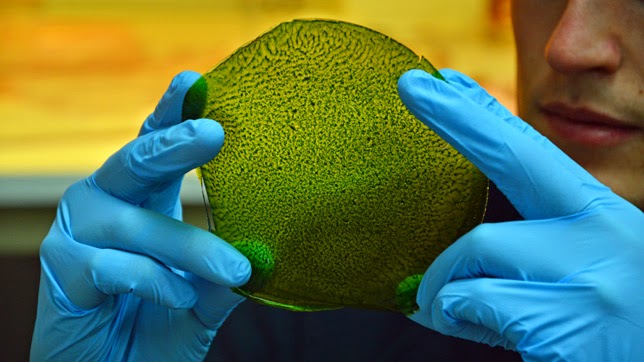Scientist, poet...poet, scientist. Opposite ends of the intellectual spectrum, you say?
Both poets and scientists begin their work with close
observation. Both employ their senses in wide-open, curious ways. Both distinguish themselves by bringing wild creativity to their work. Eve Merriam gently commands young readers who may want to be poets to behave like scientsts.
One way to approach this poem--after it has been savored and enjoyed as a whole tasty mouthful--is to blow it up large and have students develop a "Five Senses" code to label words, lines and phrases according to the sense being engaged. Do you need a sixth symbol for the sense of imagination?
- Reply to the Question, "How Can You Become a Poet?" || Eve Merriam
- take the leaf of a tree
trace its exact shape
the outside edges
and inner lines
memorize the way it is fastened to the twig
(and how the twig arches from the branch)
how it springs forth in April
how it is panoplied in July
by late August
crumple it in your hand
so that you smell its end-of-summer sadness
chew its woody stem
listen to its autumn rattle
watch it as it atomizes in the November air
then in winter
when there is no leaf left
invent one
*************
This poem appears in The Tree That Time Built, edited by Children's Poet Laureate Mary Ann Hoberman (Sourcebooks 2009).
Rake your way on over to Merely Day by Day with Cathy for the Poetry Friday Roundup.


Wow! I love this. I've never read it before. I love that she isn't afraid to use panoplied and atomize. And the last line--Boom! Yes, I think that one needs it's own color highlighter.
ReplyDeleteWow! The life cycle of a leaf - brilliant! Thanks for sharing Eve Merriam's poem, Heidi!
ReplyDeleteBeautiful poem, Heidi. I just talked to someone about taking a leaf & examining it closely, using all the words you can think of. This would be such a good mentor text for that lesson. Thank you very much!
ReplyDeleteHeidi, I love Eve Merriam's poetry. Somehow I missed this one. Thanks for sharing it!
ReplyDeleteLove the way Merriam distills the process - thanks for sharing this!
ReplyDeleteHeidi,
ReplyDeleteThis is so perfect for this time of year. There is such a connection between poetry and science. There's something about looking closely, observing, finding the right words.
I'm a huge fan of Eve Merriam's work so the poem was also a treat.
Cathy
Have loved this poem for a while! Thanks for sharing it -- I needed to read it again.
ReplyDeleteI will need to figure out how to clone myself before NCTE so that I can sit at your roundtable session while doing mine!
ReplyDeleteI love this! I agree with you, it would be great for a lesson on sensory images, but it's also just perfect to enjoy and savor! Thank you for this gift!
ReplyDeleteWonderful poem and wonderful approach to teaching it!
ReplyDelete